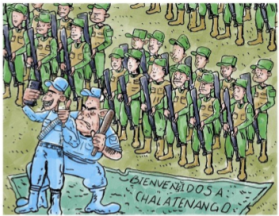Now Serving the Pueblo: Community Health Teams
By Ursula Rozum CISPES March 2012 delegate Expanding healthcare to meet the needs of El Salvador’s poor and working class majority is one of the central components of the FMLNs platform and the Ministry of Health has been hard at work making that happen. Reforms started from the first day that the new government took office in 2009 with the elimination of the “voluntary payment,” without which it was previously impossible to see a doctor. More recently, in February 2012, the Salvadoran Legislature approved the FMLN’s proposed Medications Law to overhaul the pharmaceutical industry, striking a blow to the pharmaceuticals industry which had been selling brand-name drugs for over 50 times the average international price. One of the cornerstones of the healthcare reforms are the Equipos Comunitarios de Salud Familiar, community health teams known simply as ECOS, which are tasked with offering healthcare to El Salvador’s historically marginalized rural communities. Since the FMLN victory in 2009, over 400 ECOS have been formed, serving over 140 of the 262 municipalities in El Salvador. Each ECOS consists of one doctor, one nurse, one health promoter and one other staffer who takes on many other tasks including driving, small repairs and general help to make the clinic run smoothly. The teams set up in small clinics often comprised of only a couple of rooms which include space to see patients, a waiting room and a basic pharmacy. The March 2012 CISPES delegation visited the ECOS located in San Francisco Dos Cerros which serves over 2,100 residents and 530 families in three small villages outside of the town of El Paisnal. San Francisco is about a 45 minutes bus ride away, up a bumpy dirt road, along an uncultivated landscape dotted with abandoned houses. Prior to the installation of the ECOS many of the residents of San Francisco and the surrounding towns had never seen a doctor. In San Francisco, the doctor and the nurse accept patients at the clinic three days a week and spend the other two days traveling to visit patients who cannot make it to the clinic because they are to sick or they lack transportation. Meanwhile, the health promoter makes home visits to provide prenatal care to pregnant women, to make sure that children in the community are up to date with vaccinations and in general good health, and, very importantly, to develop relationships with families. Francisco, the health promoter, stresses that one of his main roles is to create trust between the ECOS and the families in order to deliver the best possible care. Topics such as sexual health are still taboo in El Salvador, but establishing relationships allows the health promoters to discuss issues such as AIDS, other sexually transmitted diseases and contraception, particularly with youth. One expectant mother expressed her satisfaction with the care offered by the ECOS and particularly with the energetic young health promoter Francisco. This mother of seven told the March 2012 CISPES delegation, “It cost so much to get to El Paisnal [the nearest town] to give birth. I was always so worried, but now I’m not worried.” Delivering healthcare door-to-door is a trademark of the Cuban healthcare system, as is a focus on preventative community care. Many of the young doctors who coordinate the ECOS have studied medicine in Cuba. Under Salvadoran law, the patients do not pay for public health services and that in fact, it is illegal for the ECOS workers to accept any cash or in-kind payment from patients. The ECOS are a reflection of the FMLN’s commitment to meeting the basic human rights of the Salvadoran people. The future of programs like the ECOS hangs in the balance in the 2014 presidential elections. With increased right-wing party representation in the Legislative Assembly, there will likely be move to cut the budgets for these programs, which they have called “unnecessary” and “wasteful.” The FMLN and the social movement have recognized that it is essential to organize stronger resistance to the neoliberal agenda while building an electoral movement toward revolutionary change that can consolidate support for reform in the 2014 elections.

 "I am a CISPES supporter because continuing to fight for social justice and a more people-centered country means continuing the dream and sacrifice of thousands of my fellow Salvadorans who died for that vision.” - Padre Carlos, New York City
"I am a CISPES supporter because continuing to fight for social justice and a more people-centered country means continuing the dream and sacrifice of thousands of my fellow Salvadorans who died for that vision.” - Padre Carlos, New York City

